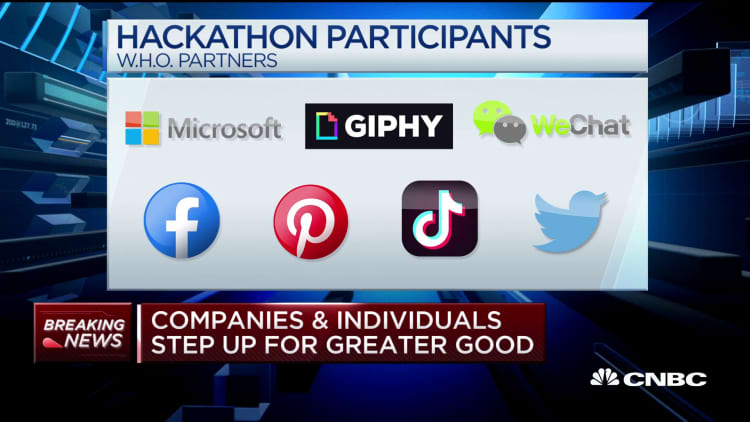The coronavirus has stressed the ability of public officials and government agencies to act quickly enough to take control of a fast-moving crisis, but one way in which New York City has moved with previously impossible speed is online. The city — beseiged by the pandemic — created a COVID-19 crisis-management software platform in a matter of days, and without writing one line of computer code. Time is of the essence.
The online portal, which allows New York to map the virus and identify hot spots, as well as connect residents to critical services, was built with no-code start-up Unqork. Backed by investors including Alphabet's CapitalG and the world's largest money manager BlackRock, Unqork's no-code software allowed the city to go live with the service in 72 hours, using no more than visual drag-and-drop tools to create it.
"Information is power, and we are in a race against the clock," said Jessica Tisch, commissioner of the NYC Department of Information Technology and Telecommunications and the Citywide CIO, in a release on Wednesday. "To fight the coronavirus pandemic, we need not only more medical equipment and testing but also more data in real time. We hope this program will serve as a model for other municipalities around the world."
The Unqork-built portal can be customized for other cities, counties or states and can be live in 48 to 72 hours.

The coronavirus build is a notable use case for no-code software, but what is referred to as low-code and no-code is fast becoming an intense area of competition between technology and cloud giants, including Microsoft and Alphabet's Google. In addition to investing in Unqork, Google Cloud acquired one of the biggest no-code players, AppSheet, earlier this year.
450 million new apps in next 5 years
"The old way of doing it for decades was to get a hundred people in IT to spend three years on the product to design software for the end customer, collecting all the information to the risk-management system and through the front and back office, and it's a massive IT project," said Alex Schmelkin, chief marketing officer at Unqork.
While the New York City case is an extremely quick build, Schmelkin said what a financial services company used to spend years on can now be built in months. "In no-code a small handful of developers gets together with business people and a final working piece of software can be produced in three months," he said.
Unqork, which employs approximately 100 coders itself, has focused primarily on the financial services sector to date because it is an industry that the start-up's top officials understand. Founder and CEO Gary Hoberman was previously chief information officer at MetLife. Its clients include John Hancock, Goldman Sachs and Liberty Mutual. But Unqork's ambitions extend to other slow-to-change sectors, like government and health care and real estate, and it works across all three major cloud platforms — Microsoft Azure, Google Cloud and Amazon Web Services, the latter of which has the largest market share in the cloud.
"We're cloud agnostic," Schmelkin said. "We said we will tackle the most stubborn, old-fashioned industries that think they can't innovate because of legacy systems or mainframes that are decades old."
"Everyone is bringing their assets to the cloud, and we can accelerate that by allowing companies to shut off data center assets more quickly," Schmelkin said.
At Microsoft, a simple run of the numbers on how many apps will be built in the next five years shows how critical low-code and no-code software will become. Microsoft expects 500 million new apps to be built in the next half decade, which is more than all the apps built in the last 40 years.
"If that's true, 450 million have to be built with a low-code tool," said Charles Lamanna, corporate vice president of the citizen applications platform at Microsoft. "There are not enough humans to code fast enough to build that many. Professional developers should focus on harder challenges than another expense submission form or approval form."

In terms of usage, its Power Apps is the fastest-growing business app ever at Microsoft, and Lamanna compared this moment in time to when public cloud infrastructure began to take off at the beginning of the last decade. "There are tons of processes today tracked in Excel spreadsheets, and being able to move to an app improves efficiency. Apps for fieldwork are growing five times faster than IT departments can satisfy," Lamanna said. "Our goals are very ambitious, mainly because we see such strong customer demand out there," he said.
The Microsoft executive — who stressed the company refers to the Power platform rather than Power Apps — said the largest value is with an integrated suite. "People don't go buy Word and spreadsheets separately," he said. Some third-party forecasts have estimated Power Apps could represent a $10 billion revenue driver for Microsoft, but Lamanna said that's not high enough. "We think the opportunity is even larger than that. It's a massive surface area," he said.
Microsoft Excel, which still requires the use of some formulas by users, is like a rudimentary "low code" software that replaced decades of number-crunching. An estimate of the number of business professionals already using Excel and doing some complicated tasks with it, and potentially migrating over to new platforms, can produce a big number. And it is expected that "self-serve" software like Excel, where the numbers of users are huge already, will move to managed platforms and increasingly become app developers.
More technology companies will build in no-code
Amit Zavery, general manager and vice president of Google Cloud who came from Oracle, said in past decades many tech vendors offered what can be considered "proto" low-code/no-code software.
"Making it easier to build an app has been around as long as software has existed, but the older products were very specific to one technology, and what's happening now is that no-code allows you to do it across multiple platforms — Oracle, Salesforce and many others — rather than be tied to one vendor. And that's where the value is getting better," Zavery said. "When it was tied to one company's product, you could not build powerful apps."
The Google Cloud executive said there's still a distinction between low-code, which requires some technical expertise to build an app, and no-code software, which is "really catering to the rank and file, anyone who has never built without needing to call IT," but Zavery thinks the world will move more rapidly to no-code.
No-code software can require only a few days for workers to get trained on, and while low-code is still easier for tech vendors to build, the no-code product set is increasing. Google acquisition AppSheet has had 1.8 million apps created on its platform. "We saw people doing lots of work on AppSheet before we bought it," Zavery said. "No-code is the next generation of change and improvements. Most vendors are going to no-code if they can build it," he said.
Every cloud vendor will have something in this area.Amit Zaverygeneral manager and vice president, Google Cloud
Google Cloud is integrating AppSheet with G Suite (the cloud-based collaboration and productivity Google set of apps that includes work staples like Gmail, Docs, Drive and Calendar), which has many non-technical business-world users in sectors like manufacturing and utilities. "We've seen lots of no-code at companies like American Electric Power, one of the largest utilities in the U.S.," Zavery said.
Alphabet is probably not done competing with rivals for acquisitions in this area, either. "Over time, anything like this usually goes through consolidation," Zavery said. "It's much more powerful if it's integrated and better built across a set of services. Every cloud vendor will have something in this area," he added.
AWS for everyone?
Recent market speculation has centered on Amazon's response to Microsoft Power Apps and Google's AppSheet deal. Even Apple has long owned a low-code platform, called FileMaker, though it gets little attention compared to its consumer products, and Apple does not compete in the enterprise cloud services market.
Amazon will have to respond to low-code and no-code, said Rob Koplowitz, vice president at Forrester Research, which coined the term "low-code" years ago. "Microsoft Azure is a major player and Power Apps is a big push for them," Koplowitz said, and he added that the Google acquisition of AppSheet was at least partly a response to Microsoft.
"I suspect the answer is AWS needs to develop something itself, but for all of them, there is still this careful dance to be done about nurturing large partner ecosystems," Koplowitz said. "If you are selling AppSheet, users don't want to be told they have to deploy on Google Cloud."
AppSheet continues to be available on all the major cloud platforms, while Google Cloud offers no-code software like Unqork. "Unqork is now deep in one industry, financial services, so not a competitor to AppSheet. Over time users might be able to use one or the other, but today we don't see that," Zavery said.
Adam Bosworth, a well-regarded technology executive who had been linked to reports of an "AWS for Everyone" product in recent years and "gave some credibility to the effort at Amazon," according to Koplowitz, recently left Amazon. But Bosworth said in a personal blog post that the project he had worked on at Amazon was coming "relatively soon" and has "as much potential as any I've ever built."
John Rymer, Forrester Research vice president and leader of its cloud platform application development research effort, said tech vendors that have the most momentum, growing 100% a year, are in low-code niches. "It's just massive, growing really fast," Rymer said. Everyone is curious about Amazon's plans, but "regardless of what Bosworth and his guys have built, AWS has a serious challenge in front of it in low-code," he said. "Their core customer is the 'alpha geek,' period. The alpha geeks will say 'Real men code' and say 'Low code? Forget it.'"
Amazon Web Services spokesman Scott Beaver declined to comment on any plans it has for low-code or no-code software services.
A 1 million developer shortfall
Coders and software engineers who build complex applications will not be going away. They may just be going even more to jobs at the tech giants. The more no-code platforms grow, the more demand there will be for the specialists to run the underlying technology.
"If people build on Google Cloud using AppSheet, the volume of users and data keeps going up, so I need more people to keep running the infrastructure so it can scale," Zavery said. "And software engineers building complex apps will still exist. Tech like the Uber app can't be built using no-code."
With the software vendors hiring engineers aggressively, shortages in finding talent to build applications result in the risk of companies waiting too long before they can deliver to business users. "This is a good way out," Zavery said. "You don't have to hire lots of people, since you can't find them anyway. It's a good way to get going and not have business disruption."
Companies outside tech need their most sophisticated software engineers to be more productive and, at the same time, increase the number of staffers who can access and create enterprise technology even if they did not come from a computer science background.
"There is a 1 million developer shortfall in the U.S. alone, and all these companies are struggling to create content and applications to go truly digitally native. You don't need someone who studied comp sci for four years," said Microsoft's Lamanna.
Unqork now has more than 2,000 people it has trained and certified to build on its software-as-a-service platform. The start-up says that the first set of badges can be completed in one to three weeks (it has had high school juniors who were trained and certified in less than a month) and "master level" reached in under three months.
"People can be coding in Java for 10 years and still not be considered master level," Schmelkin said.
Unqork has started to see its skills certifications show up in LinkedIn profiles. "If you look at some Liberty Mutual employees, they are showing on LinkedIn their Unqorked badges," he said. "I grew up as a coder and a hacker, and I believe there will always be need for incredible programmers and technologists, but can't train them fast enough, and it's harder to get them into stodgier industries. Even an enormous bank in the Midwest will have a hard time competing with Google, Facebook."
But there are risks in turning every employee into an app developer without setting up the proper processes and infrastructure first, Forrester's Rymer said. He was aware of one large insurance company that inherited a portfolio of 16,000 Quick Base applications running on a version of Quick Base that had been end-of-lifed.
"That's the example of a company that brings in low-code with no governance, and it's a nightmare," Rymer said. "That was completely the fault of the customer and illustrates how badly things can go without governance."
Quick Base, like most other vendors, has been building tools to help customers govern their low-code development projects and portfolios.
"That's what people are afraid of. It's just gonna be chaos and business people creating junk, and IT forced to support it," Rymer said.

Story has been updated to include comment from Forrester Research analyst John Rymer on Quick Base.






